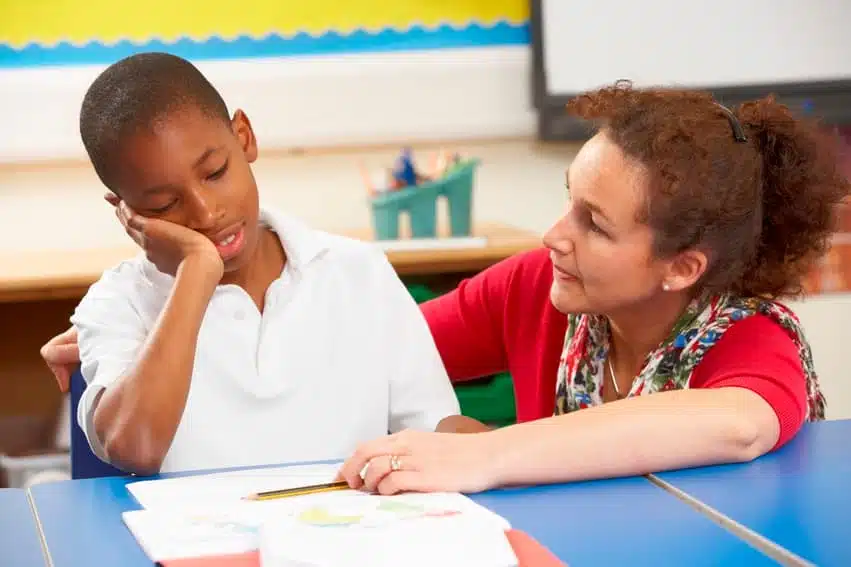The legacy of COVID combined with the cost-of-living crisis will be a tsunami of mental health problems emerging across the country among children and young people unless systems are put in place to ensure that people with mental ill health get the right support at the right time.

As we mark World Mental Health Day, we see a generation of young people severely impacted by the COVID pandemic and subsequent lockdowns, many of whom has experienced mental health problems as a result.
According to NHS Digital, one in six children aged five to 16 were identified as having a probable mental health problem in July 2021 – 16 months after the first lockdown - a huge increase from one in nine in 2017.
A report by The Commission on Young Lives, chaired by former children’s commissioner, described “a profound crisis in children and young people's mental health services in England and a system of support that is buckling under pressure, frequently over-medicalised and bureaucratic, unresponsive, outdated, and siloed”.
The report highlighted:
- There was a 47% increase in the number of new emergency referrals to crisis care teams in under-18-year-olds between December 2019 and April 2021.
- At the end of April 2022, 388,887 people were in contact with children and young people's mental health services, and 352,866 new referrals were received.
- Yet in 2020/2021, just 23% of children referred to services started treatment within the 4-week waiting target.
Buckling under pressure
The report also cites how some young people have barely returned to school since COVID, the increase in the regularity and extreme nature of many young people's mental health problems and how self-harm and suicide attempts are a much more regular feature of school and college life.
Anne Longfield, Chair of the Commission on Young Lives, said: “The children's mental health emergency in England is so profound that we face a generational threat to our country's future national prosperity and success. The scale of the problem is growing, rocket-boosted by the pandemic and the system is buckling under pressure and unable to cope with the explosion in demand for help.”
A survey for the Early Intervention Foundation found that eighty two per cent of teachers are seeing anxious pupils and the worsening of existing mental health problems, compared to just one year ago.
Secondary schools and teachers face multiple barriers to better supporting pupils’ mental health – largely due to a lack of qualified staff, insufficient help from other professionals and critically a lack of time, the survey by TeacherTapp for the EIF found.
Unhappy
Furthermore, the Children’s Society’s Good Childhood Report found more children (aged 10 to 17) are unhappy with school than with the other aspects of life they are asked about. Happiness with school and schoolwork declines significantly with age and is far lower among children in lower income households.
The report cites that 85% of parents and carers are concerned about the impact of the cost-of-living crisis on their household/family over the next 12 months, which will only get worse as this crisis unfolds.
This breadth of research illustrates the impact that COVID and lockdowns has had on children and young people’s mental health while the cost-of-living crisis is beginning to kick in. Further financial pressures on families are only going to exacerbate pre-existing mental health problems and result in more problems emerging.

Schools are lacking resources
Yet the help that is available is simply not enough to tackle the wave of new cases of young people requiring treatment and support.
While the NHS revealed in May that more than 2.4 million children and young people now have access to mental health support in schools and colleges, a strategy first mooted in the Children and Young People’s Mental Health Green Paper published in 2017, Anne Longfield revealed in her report that there will be mental health teams in only a third of all schools, leaving two thirds of children in schools without this important resource.
Last December, the health and social care parliamentary committee warned that despite progress being noted towards the implementation of proposals and ambitions laid out in the 2017 Green Paper and the NHS Long Term Plan for 47% of school children able to access new Mental Health Support Teams by 2023–24, far too many children and young people will be unable to access the care that they need.
The committee concluded in their report that children and young adults are waiting “far too long” for access to mental health services with too many placed in inpatient units far from home and facing inappropriate care.
Young people from ethnic minorities
Vulnerable groups of young people are becoming the hardest hit. A report by Youth Futures Foundation revealed that the cost-of-living crisis is impacting thousands of young people from ethnic minorities as they struggle with mental health problems.
Two in five young people from ethnic minority backgrounds say their mental health suffered due to the COVID-19 pandemic, and now the cost-of-living crisis poses yet another threat.
More than one in 10 young people from an ethnic minority background have had to take a job with fewer progression opportunities because they need the money, meaning mental health problems combined with the pressure of needing to make ends meet, could push young people further away from the labour market
So how can we prevent the existing crisis in children and young people’s mental health care becoming exacerbated by the cost-of-living crisis?

Prevention better than cure
Half of all mental health conditions become established before the age of 14 and so resources need to be targeted at young people showing signs of mental ill health.
WillisPalmer’s Head of Practice Lucy Hopkins, said: “We are seeing an increasing number of children needing the support and intervention of mental health services, and many are subjected to long waiting lists to access necessary services and little interim support.”
“Schools are ideally placed to pick up on changes in their pupils and potential signs of emerging mental health concerns, but the difficulty they have is that they are already overwhelmed with the educational COVID recovery plan to get children to where they should be academically so often they do not have the time – or skills – to be dealing with the many issues which can affect children and young people, particularly post COVID where there has been a rise in domestic abuse, substance misuse and mental health problems.”
“ At WillisPalmer we are extremely aware of the difficulties facing schools in trying to support children, and so we have developed our School Social Work Service . This involves an expert social worker being based in a school for one day per week to advise and support teaching and non-teaching staff on issues around safeguarding and the emotional wellbeing of children that is affected by their lives away from school, and we are confident that we can provide schools with that extra support they need to better support children and young people.” said Lucy.
Timely Intervention
Dave Wareham, who is WillisPalmer’s Head of Services, agrees. “Prevention is always better than the cure, whether that is regarding mental health or other social support.
“As preventive services have been pared back over the years, we saw the need for our Family Support Service increase, including support for parents who are experiencing mental health difficulties, with the aim of minimising potential negative affect on their children.
“Certainly, getting in early with families and providing timely intervention then is far better for the family and far cheaper long term, than leaving families unaided to navigate their issues alone resulting in an escalation of need and .”
“The whole agenda on prevention and early help services needs to be revisited soon, as recommended by the independent care review, to ensure that children are families are getting the support they need, when they need it,” concluded Dave.
Social workers know that if some of these issues being experienced by children and young people are not addressed in a timely manner they will only lead to increased and more severe issues in adulthood, and significantly impact on the future of young people and society as a whole. We hope that any forthcoming changes and developments for children and young people, following the care review published earlier this year, will provide for further clarity and focus around the issues of mental health and emotional wellbeing and the availability of services that can, and should, be supporting those who are in need of them.
In addition, we hope that World Mental Health Day opens the door to provide more opportunity for both adults, children and young people to have conversations about mental health so that together we can continue to work towards making mental health and wellbeing for all a global priority.


